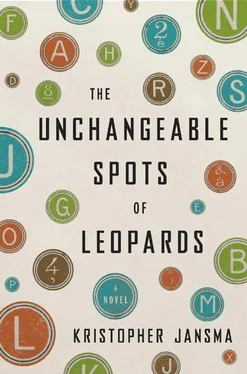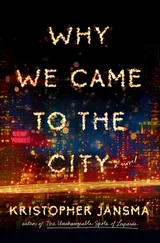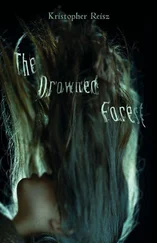I admired Tim’s sense of civic responsibility. At first I suspected his outrage for the underprivileged was just a way of getting bleeding-heart publishers to print his work, but soon I saw that he genuinely cared for these children. He was certainly very different from any writer I’d been friends with previously.
The children wrote him letters, and he spent Saturdays with them at the park. He was a good person, in other words, and being around him made me feel like a good person too, even as I was furiously rewriting old stories about all the not good people I’d known and loved, before. Egotistical and insane writers. Self-absorbed socialites with emotional distance issues. The very people who had chewed me up and spit me out. I dreamed of tying it all together into a novella that could encapsulate an article I’d written for Esquire (though they’d refused to print it), as well as my only published story—“Anton and I”—a chilly little work of fiction that had received little fanfare and vanished with even less. The larger novella that I envisioned followed a young man from Raleigh who sells his soul to become a writer; moves to Manhattan with his college roommate, Julian; and proceeds to lose everything — his epic first novel is lost in a lake; Evelyn, his one true love, marries an Indian prince; and he and Julian get in a fistfight on the rim of the Grand Canyon; etcetera, etcetera.
One evening, after a particularly brutal disembowelment of Tim’s piece, “No Number-Two Pencil Left Behind,” about the suspicious relationship between the standardized-testing industry and the Bush administration, he and I went out to the Lion’s Head Tavern on Amsterdam. There we often acerbically discussed the latest flashes in the pan while we pretended to be great writers ourselves — like Norman Mailer or Lanford Wilson — even though their Lion’s Head had been in the Village and closed for years.
“I thought it was very well written,” I told him. “I liked Deshawn’s line about how the tests were like evolution, like survival of the fittest, except the people who survived were just the ones who cheated the best.”
“It doesn’t matter,” Tim moaned into his beer. “I can write it as well as I want, but without hard evidence from former Department of Education people, it all may as well be fiction.” He paused a moment and then added, “No offense.”
“None taken,” I said, getting up to order a fourth round. From the bar I could see that poor Tim was truly crushed. When he thought I wasn’t looking he took out a small photograph of Jessina that he kept in his wallet — taken on the steps of the New York Public Library, while she chased pigeons at the bases of the great stone lions. He’d taken her there on a Sunday, after her family had finished church. He told me she’d read for four and a half hours without stopping. At home she had no books. The ones that Tim gave her, Jessina’s mother kept throwing away; I’d never understood why.
As I returned with our beers, I watched Tim slip the photo back into his wallet. Then he folded up the pages of his essay in resignation.
“I’m going to have to go back to Scotland,” he sighed. “Do you know how goddamn cold it is in Scotland?”
His student visa was past expired, and his application for dual citizenship had gotten him nowhere fast. He’d been writing freelance, for blogs and other nonpaying entities, and barely getting by. All in the earnest hopes of someday landing a job as a real reporter. Honest work wasn’t easy to come by and Tim had been down every available avenue, twice, and still always wound up right back where he’d begun. There was only one thing I could think of to do to help him. Something I was terribly good at. Something I had not done in far too long.
I lied.
“You know, I have a brother-in-law who works for a company that scans all those SATs and GREs and everything,” I said. I didn’t have a brother-in-law. I didn’t even have any siblings.
“Scantron!” Tim said excitedly.
“That’s it, Scantron!” I said. “I can’t believe I didn’t think of it before. Anyway, I’d be happy to get in touch with him to see if he knows anything.”
The rest was easy. With a little help from Google and Photoshop, the twin engines of modern-day con artistry, I produced a perfectly passable letter from an anonymous colleague of my fictitious brother-in-law’s, which suggested that Tim was, indeed, onto something. Nothing damning or concrete. Just enough to give the ring of truth to Tim’s article. Armed with my letter, Tim went on to finish his piece, publish it in Educator’s Monthly , and win the Dunnigan-Pyle Award for Investigative Journalism. Jessina and Deshawn got to shake hands with the mayor, and some philanthropist donated two hundred thousand dollars to their school. Tim moved to a bigger apartment and asked me to take the spare room, free of charge.
Talk about your win-win situations.
“It’s all thanks to you,” he’d say whenever I protested — which I made a point to do each month when the bills came. “Your big break is coming any day now, I can feel it.”
In the mornings we woke and toiled away in the apartment, dreaming of becoming the next Mencken and Dreiser. Tim sent out résumés to newspapers, television studios, and magazine publishers — anyone who might have been looking for a young, eager reporter. Though he kept on calling about his application for dual citizenship, the wheels of government ground slowly. Still worried about deportation, Timothy applied for a job teaching courses in journalism at City University. Just something to fall back on.
As June came to a close, I heard from the first round of literary agents, who collectively declared my novella “forced,” “unrealistic,” and filled with “less-than-charming characters.” As I drank my way through the dog days of July, Tim began to get offer upon offer for his brilliant journalistic mind. And while everyone loved his work on the standardized-testing piece, citing his “bloodhound’s nose for the truth,” the insults continued to come flying toward me through each mail delivery — my hardly fictional writing was, apparently, also “fantastical,” “emotionally dishonest,” and “frankly, simply not believable.”
Aside from my appreciation for a little irony, you can imagine my frustration. When Timothy Wallace left in August on a year-long assignment in West Africa for the BBC, I stayed behind in his apartment, still hoping that my luck would soon change.
Drunk and depressed, I neglected to transfer the lease, or the utilities, to my own name. A few bank statements arrived from a Chase account that Tim had not had time to close, so I just found a refill checkbook and began paying the bills. When the account ran out, I deposited my own money into it. Gradually, I became a little more Tim, and a little less me. My novella, and everything that had inspired it, began to feel like a distant memory — part of someone else’s life. Someone else’s beginnings, not mine.
Then one day, sifting through the stacks of mail, I found a letter from City University, offering Timothy Wallace four sections of Introduction to Journalism. The semester was slated to begin the following week. Desperate and a little inebriated, I wondered if that maybe I could substitute for Timothy, seeing as how the school probably wouldn’t have time to find another replacement. Tim had left behind his books and syllabi, so I spent the week studying Harrower, and Zinsser, and the AP stylebook, and putting together my own thoughts on these subjects. I stayed up late at night, reinventing myself as an expert on truth telling, and when I woke from bleary half sleep, I was one fraction less of the man I’d been when I’d fallen into bed.
Читать дальше











